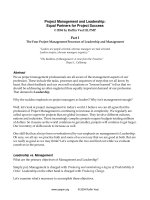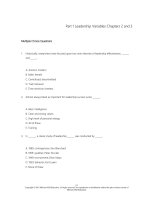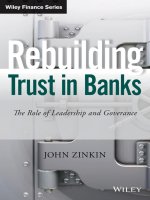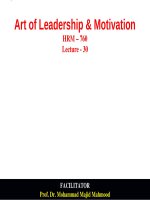Lecture Art of Leadership and Motivation - Lecture 17
Bạn đang xem bản rút gọn của tài liệu. Xem và tải ngay bản đầy đủ của tài liệu tại đây (632.92 KB, 21 trang )
Art of Leadership & Motivation
HRM – 760
Lecture - 17
FACILITATOR
Prof. Dr. Mohammad Majid Mahmood
Habits of Highly Effective
Leaders-I
2
Exercise
• Think of two habits you have, one good & one
bad
• Are you willing to break away from bad habits?
• If so write down three things you will do
immediately to break away from it.
3
PROBLEM IS NOT A PROBLEM,
THE WAY WE SEE THE PROBLEM IS
THE REAL PROBLEM
4
Paradigms
• Paradigms are frames of
reference
‘we see the world not as it
is but as we are,- or
sometimes as we are
conditioned to see.
• Our paradigms, correct or
incorrect, are the sources
of our attitudes behaviors
& ultimately our
relationship with others
-STEPHEN R COVEY
5
Paradigms
It’s the way we “see” the world – not in
terms of our visual sense of sight, but in
terms of perceiving, understanding and
interpreting.
6
Principles of Growth and
Change
A child learns to sit up, to crawl and then to
walk and run. Each step is important and each
one takes time. No step can be skipped.
7
A New Level of Thinking
“The significant problems we face cannot be solved at the
same level of thinking we were at when we created them.”
–Albert Einstein.
We need a new level, a deeper level of thinking
8
Habits
Our character is a collection of our habits , and
habits have a powerful role in our lives.
Habits consists of knowledge , skills and desire.
Knowledge allows us to
know what to do
Desire is the motivation
to do it
Skills gives us the ability
to know how to do it
9
Habits
Knowledge
(what to, why to)
Skills
(how to)
Desire
(Want to)
We are always conditioned
by the gripping power of habits10
7 Habits
The 7 habits moves us through the following stages:
Dependence: The paradigm under which we are born ,
relying upon others to take care of us.
Independence: The paradigm under which we can
make our own decisions and take care of ourselves.
Interdependence: The paradigm under which we cooperate to achieve something that cannot be achieved
independently.
11
7 Habits
The 7 Habits Effectiveness Process provides the foundation
necessary to foster change and improvement at the:
Personal,
Interpersonal,
Managerial, and
Organizational Levels.
12
The 7 Habits Can Help Organizations Experience:
Increased overall effectiveness;
13
The 7 Habits Can Help Organizations Experience:
Strengthened relationships at all levels;
14
The 7 Habits Can Help Organizations Experience:
A heightened ability to cope with change;
15
The 7 Habits Can Help Organizations Experience:
Reduced turnover rates through an increase in the ability of
employees to see the "big picture" and commit to the organization's
strategy and vision;
16
The 7 Habits Can Help Organizations Experience:
Improved quality through greater collaboration of cohesive work
teams;
17
The 7 Habits Can Help Organizations Experience:
Better client relations and enhanced customer loyalty;
18
The 7 Habits Can Help Organizations Experience:
Fewer misunderstandings, which result in the loss of time and
money;
19
The 7 Habits Can Help Organizations Experience:
Improved innovation, decisionmaking, and problemsolving
capabilities by improving skills of cooperation.
20
FACILITATOR
Prof. Dr. Mohammad Majid Mahmood
1-21









